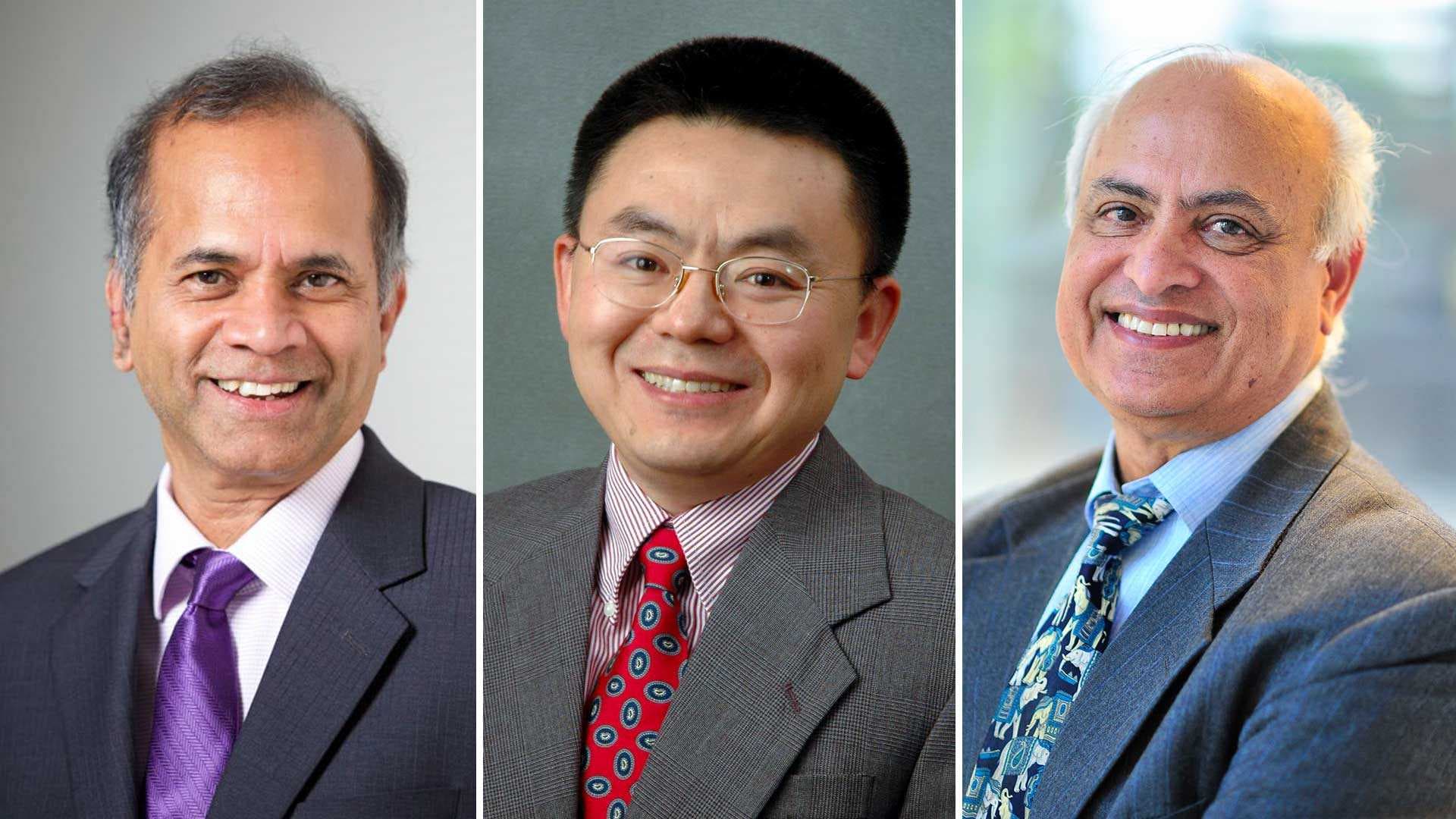Three Faculty Members Elected to National Academy of Engineering
Innovators in New Materials, Rotorcraft Design, AI Honored; Former Vice President for Research Also Recognized

The election of engineering professors, from left, Rama Chellappa, Ji-Cheng “JC” Zhao and Inderjit Chopra to the National Academy of Engineering boosts the number of UMD faculty in the national academies to 67.
Three University of Maryland professors are among the 124 engineers newly elected to the 2023 Class of the National Academy of Engineering (NAE), one of the highest professional distinctions accorded to an engineer.
The recognition of Inderjit Chopra, Distinguished University Professor and director of the Alfred Gessow Rotorcraft Center; Ji-Cheng “JC” Zhao, chair of the Department of Materials Science and Engineering and Minta Martin Professor; and Rama Chellappa, College Park Professor and professor emeritus at UMD and Bloomberg Distinguished Professor at Johns Hopkins University, brings the total of affiliated faculty elected to NAE to 33. They also increase the number of UMD faculty in the national academies to a record-high 67.
The new NAE members announced today are peer-selected for pioneering new technologies, advancing engineering education, outstanding business and government leadership, and contributions to engineering research and practice.
“Through their many discoveries, patents and fundamental contributions to the engineering field, Drs. Chopra, Zhao and Chellappa are well-deserving of this national honor,” said UMD President Darryll J. Pines. “From developing innovative new materials to pushing the boundaries of flight to advancing artificial intelligence, their work is central to solving the grand challenges of our time.”
Samuel Graham, Jr., dean of the A. James Clark School of Engineering, said the UMD trio’s election reflects their outstanding contributions, both technically and in service to humanity.
“We’re proud to have such accomplished faculty as part of the Clark School community, ones who are dedicated to excellence in their field and to creating a better society,” he said. “We celebrate with these Maryland engineers today and thank the National Academies for recognizing their contributions to our profession.”
Also joining this year’s class is bioengineer and former Vice President for Research Laurie E. Locascio, who departed Maryland in 2022 following her confirmation by the U.S. Senate to serve as director of the National Institute of Standards and Technology and under secretary for standards and technology in the Department of Commerce.
The academy hailed Chopra “for advancing rotorcraft aeromechanics/aeroelastic analysis, enhancing bearingless rotors, active control, and human-powered helicopters.” A UMD faculty member for more than four decades, he has worked on fundamental problems related to aeromechanics of helicopters, including advanced designs, aeroelastic stability, active vibration control, composite blades, smart structures, micro air vehicles and delivery drones, and comprehensive analysis. Among his innovative designs are a world-record-holding human-powered helicopter, cyclocopter, a da Vinci-inspired “aerial screw,” MARS helicopter, solar-powered helicopter and quad-biplane. His graduate advising resulted in 61 Ph.D. and 125 M.S. degrees, and his former students now play dominant roles in rotorcraft industry, academia and federal labs.
Chopra is a fellow of the American Institute of Aeronautics and Astronautics, VFS (the Vertical Flight Society, formerly the AHS/American Helicopter Society) and American Society of Mechanical Engineers, and an honorary fellow of AHS. Among other honors, he was recently awarded AIAA’s 2023 Walter J. and Angeline H. Crichlow Trust Prize, which includes a $100,000 cash prize.
The NAE honored Zhao “for contributions to computational alloy design, integrated computational materials engineering and high-throughput methods used in industrial products.” He is a pioneer in the development of accelerated methodologies for discovery and rapid screening for metals as well as a renowned expert on computational design of materials. He has made outstanding contributions to basic and applied research in metals and their deployment in critical applications in energy infrastructure.
Zhao received the 2021 TMS William Hume-Rothery Award, which recognizes a scientific leader for exceptional scholarly contributions to the science of alloys, and a 2022 Humboldt Research Award, and he is slated to receive the 2023 J. Willard Gibbs Phase Equilibria Award from ASM International. He is a fellow of ASM International, the Materials Research Society, the National Academy of Inventors, the American Association for the Advancement of Science and the Minerals, Metals and Materials Society. Zhao is also an inventor on 49 issued U.S. patents and has experience in industry government (four years at ARPA-E) and academia.
Chellappa, whom the NAE cited “for contributions to digital image analysis, automatic face recognition and applications,” is a groundbreaker in the area of artificial intelligence. His work in computer vision, pattern recognition, and machine learning has had profound impact on areas including biometrics, smart cars, forensics, and 2D and 3D modeling of faces, objects, and terrain.
He is the 2020 recipient of the Jack S. Kilby Signal Processing Medal—a top honor from the Institute of Electrical and Electronics Engineers (IEEE), where Chellappa is a life fellow—for his contributions to image and video processing. Among other honors, he has won technical achievement awards from the IEEE Computer Society and the IEEE Signal Processing Society; the latter also awarded him with its highest honor, the Society Award. Chellappa joined Johns Hopkins in 2020 after 29 years at the University of Maryland, where he served lengthy stretches as chair of the Department of Electrical and Computer Engineering and director of the Center for Automation Research. He maintains ties to UMD through his appointments in the department and the Institute for Advanced Computer Studies.
Aerospace Engineering Electrical and Computer Engineering Materials Science and Engineering Research